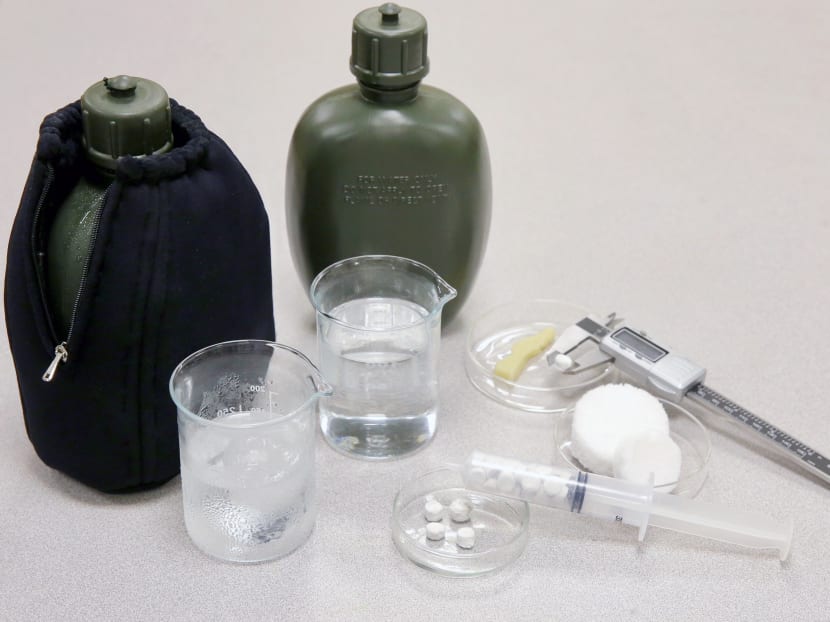Don’t trash your old clothes, they may be able to save lives
SINGAPORE – Instead of throwing out that old, worn cotton T-shirt, it can now be turned into a supermaterial to help save lives, and keep drinks cool for a longer time.

Researchers from the National University of Singapore’s Faculty of Engineering have found a way to convert cotton-based fabric waste from unwanted clothing into cotton aerogels. Photo: Koh Mui Fong/TODAY
SINGAPORE – Instead of throwing out that old, worn cotton T-shirt, it can now be turned into a supermaterial to help save lives, and keep drinks cool for a longer time.
In a world first, a team of researchers from the National University of Singapore’s (NUS) Faculty of Engineering has found a “fast, cheap and green” way to convert cotton-based fabric waste from unwanted clothing into cotton aerogels, a highly porous and light material with strong absorption capacity and low thermal conductivity.
First created in the 1930s, commercially-produced aerogels today are usually derived from wood and glass fibre. They are used to absorb water-insoluble liquids such as oil, as well as for heat and sound insulation.
Associate Professor Hai Minh Duong, one of the lead researchers on this project, said their method of producing aerogels is more cost-efficient and quicker as compared to the commercially produced versions, which take three to seven days to produce. In comparison, cotton aerogels can also be produced within eight hours to two days, said the researchers as they unveiled their findings in a media conference on Wednesday (Jan 24). They can also be easily compressed, reducing storage and transportation costs.
Their product is also more eco-friendly, as fabric waste which is usually resold as second-hand clothes or donated to others, can now be turned into aerogels. Assoc Prof Duong also noted that Singapore disposes one tonne of textile waste every five minutes, and 92 per cent of such waste is incinerated as there is no textile recycling plant here.
“This new eco-friendly cotton aerogel is a major improvement from the aerogel that our team had previously developed using paper waste,” said Assoc Prof Duong. He added that they “will continue to explore new functions for this advanced material”.
The NUS team took more than two years to develop and patent their method, which cuts fabric waste into small pieces before blending to form recycled cotton fibres. Water and a solvent is added to the fibres before they are placed in the freezer for 24 hours. The mixture is freeze-dried to remove the water and then cured for three hours before the cotton aerogel is formed.
There are two main uses for their product. At present, haemorrhage control devices comprise a syringe filled with small capsules of cellulose-based sponge. This is inserted into a gunshot or deeply penetrating wound - which can be life-threatening - to release the capsules, which expand and apply pressure on it to stop blood flow. The pellets made from cotton aerogels developed by the NUS researchers can expand to 16 times its size in 4.5 seconds, and absorbs blood three times faster than existing pellets, said Assoc Prof Duong.
The research team also worked with DSO National Laboratories, the largest defence research and development organisation here, to develop a thermal jacket for the military canteens that soldiers use to carry fluids. The jacket, which weighs about 200 grams, comprises cotton aerogel that is sandwiched between neoprene and polyester fabrics.
This allows for the ice slurry of crushed ice and liquid water in military canteens to stay at a temperature of -2°C for four hours. Without a jacket, a canteen can only keep water cold for about 30 minutes.
Its manufacturing cost of about S$8 is also cheaper than a vacuum flask, and the thermal jacket is also lighter and more effective at heat insulation.
Professor Nhan Phan-Thien, who is also a lead researcher on the team, added that the heat insulation properties of the cotton aerogels can also be applied to other consumer product such as cooler bags to keep food items fresh.
“We also foresee tremendous potential for other high value applications, such as pipeline insulation and transportation of liquefied natural gas which needs to be stored at a low temperature,” he said.
The team is currently in talks with two companies from Singapore and the United States to commercialise the technology.






